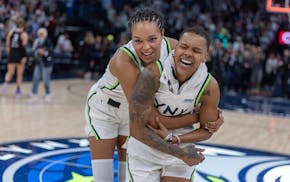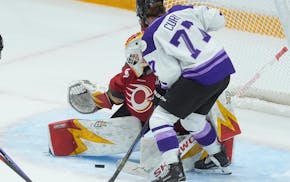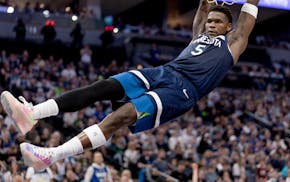The questions from football fans, both the heavily invested and the casual, become more frequent as May turns to June, June turns to July and July turns to August.
"How are the Gophers gonna be this season?'' come the queries, usually followed by, "What's their record gonna be?''
Those straightforward questions usually prompt an answer that's an educated guess of the ceiling and floor of where a team might finish. When it comes to the Gophers in 2024, though, changes in the Big Ten make predicting their record more difficult.
The addition of UCLA, USC, Oregon and Washington – teams that combined to win 85 Pac-12 football titles over the years – makes the Big Ten a deeper and more talented conference. And coupled with the elimination of the East and West Divisions, the West's easier route to the Big Ten Championship Game goes away. Instead, the two teams with the best Big Ten records will advance to Indianapolis.
Outside expectations for the Gophers aren't high. Las Vegas oddsmakers opened with an over/under of Minnesota's win total at 4.5, and that figure now sits at 5.5. The Gophers also were picked to finish 12th in the 18-team Big Ten in the Cleveland.com preseason poll of conference media members.
Those are largely a product of the Gophers' 6-7 record of 2023, when they went 5-7 in the regular season but won the Quick Lane Bowl after advancing to the postseason on the strength of their academic progress rating.
Gophers coach P.J. Fleck has praised the competitive nature that his 2024 squad has shown during training camp, and he believes the team's depth is the best it's been in his eight years in Dinkytown. Like every coach in the land, he'll deliver a Heisman-esque stiff-arm if you ask for a win total. After all, even if a coach believes his team might finish say, 8-4, he's not about to tell his players that it's OK to lose four games.
"I'm the boring guy when it comes to talking about what success for your team because you're gonna get an answer you don't want. I'm not gonna give you a number," Fleck said. "If I can get the most out of the team, and I can make decisions with clarity and calmness and be confident in this team, I think we will be really successful.
"… I know I have to win football games, or I don't get to do my job. But my job is to make sure that these guys are successful. Period. This year, next year, when they're 35, when they're 55."
Aiming for a rebound
Fleck is aware that last year's finish – his second sub-.500 mark in Minnesota in a full, 12-game schedule – did not meet expectations that the fan base demands. The downturn came after a stretch in which the Gophers had an 11-win season and two nine-win campaigns in a four-year span, and Fleck believes the heightened expectations are a good thing.
"The narrative in our place right now is, 'What are you gonna do after the disappointing year?' We just won a bowl game! There are people here just trying to get to a bowl game, and we won our fifth in a row," Fleck said during Big Ten Media Days in July. "It's disappointing, but that's what we said at the beginning. When [winning a bowl game] becomes disappointing, we're doing our job even better. There's going to be ebbs and flows."
Judging the ebbs and flows of the program is Fleck's boss, athletics director Mark Coyle. They've been together since Coyle hired Fleck in January 2017, and they're the longest-tenured football coach/AD combo in the Big Ten. Coyle wants to keep it that way. After UCLA pursued Fleck for its coaching job in the offseason, Coyle gave Fleck an amended contract that will give the coach an additional $5.7 million if he stays through the 2029 season. Fleck is making $6 million per year.
While Coyle said his goal for the program is "to compete at that highest level, and that's the College Football Playoff," his expectation for any particular season isn't as easy to pin down.
"We talk about the importance of being relevant," Coyle said. "And we've talked to our coaches about with this new Big Ten, with everything that's happening across college athletics, if we're relevant – bowl games, NCAA tournaments, our teams going to postseason play – you're going to be in a good spot. Obviously, if you're competing in the Big Ten at a high level, you're going to have that chance to do things on the national level."
An example of hope
If you're looking to see when the Gophers last competed at a national level, you need to go back only five years, when the 2019 team went 11-2.
In Fleck's third season as Minnesota coach, the Gophers opened with one-score victories over South Dakota State, Fresno State and Georgia Southern and mostly breezed through five Big Ten games, reaching 8-0 and No. 17 in the College Football Playoff rankings. A 31-26 win over No. 4 Penn State moved the Gophers up nine spots to No. 8 in the CFP rankings.
That's as high as they would get, falling to No. 10 after a loss at Iowa, bouncing back up to No. 8 after a win over Northwestern, then finishing the regular season 10-2 and No. 18 after a loss to Wisconsin. The Outback Bowl win over Auburn left them No. 10 in the CFP, Associated Press and coaches polls – their best final ranking since 1962.
That 2019 season was played with a four-team playoff. Had there been 12 playoff spots – as there are this year for the first time – the two-loss Gophers still would have been outside looking in, while a one-loss team would have made it. If, and likely when, the playoff expands to 16 teams, a scenario like what played out for the Gophers in 2019 would have had them near the bubble of making the field.
"How cool would that have been for our fan base?" Coyle said.
Fleck likes how the expanded playoff field offers hope to programs that might not be consistent title contenders, a category the Gophers occupy.
"There might be six or seven surprise teams that have a legitimate shot of getting there if they have a special year," he said.
For now, the Gophers first will focus on getting on the right side of .500 after last year's struggle. After that, contending in a bigger, division-less Big Ten is the goal.
"I still think it's a clear path," Fleck said. "It's just a lot bigger of a path for a lot of other teams."

Correa details his concussion and bouts of dizziness as he returns to Twins lineup

Twins walk off winners over the Royals on France's home run

Lynx remain perfect in 2025 after rallying past the Sun

The Frost's Game 2 hero in the PWHL Finals embraces the boos

